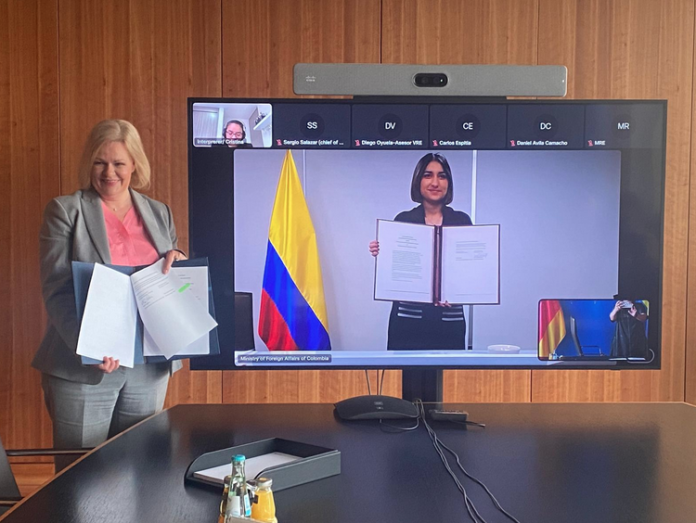 German Interior Minister Nancy Faeser and Colombia’s Foreign Minister Laura Sarabia both signed the Joint Declaration of Intent. Photo: Cancilleria
German Interior Minister Nancy Faeser and Colombia’s Foreign Minister Laura Sarabia both signed the Joint Declaration of Intent. Photo: Cancilleria
Germany and Colombia signed an important agreement on Wednesday to deepen cooperation on migration policy, strengthening legal pathways for Colombian nationals to study, train and work in Germany, while also stepping up efforts to curb irregular migration.
German Interior Minister Nancy Faeser and Colombia’s Foreign Minister Laura Sarabia both signed the Joint Declaration of Intent, one in Berlin, and other in NewYork, where the country’s top diplomat is attending the UN Security Council.
“Colombia is a key partner for Germany – not only in fighting organized crime and drug trafficking, but also in preventing irregular migration,” said Faeser, highlighting Germany’s broader strategy of targeting legal migration channels while clamping down on asylum abuse.
The agreement formalizes the intention of both governments to encourage the migration of Colombian youth for training, education, and employment in sectors facing labor shortages in Germany. It also outlines coordinated measures to reduce unfounded asylum claims and promote awareness of legal migration opportunities.
According to German authorities, only 0.3 percent of asylum applications filed by Colombian nationals are successful. Despite Colombia ranking 8th among countries with the most asylum seekers in Germany, the vast majority of claims are rejected — a trend that Berlin and Bogotá have now pledged to jointly address.
Since an initial agreement on migration cooperation was reached in February 2024, asylum applications from Colombians have declined sharply. In the first quarter of 2025, Germany recorded a 42 percent drop in Colombian asylum requests compared to the same period in 2024.
At the core of the new agreement is a shift toward skills-based migration. “This is an excellent opportunity to attract productive and skilled workers to Germany,” Faeser said. “We are offering young Colombians good training opportunities and helping skilled workers to come to Germany and work here.”
Sarabia emphasized that the agreement is about more than just migration controls — it’s also about shared goals in education and development. “I welcome the signing of this Declaration, which demonstrates how we are working together in the areas of education, technology, migration and labour,” said Sarabia. “We are very grateful that Germany is not only Colombia’s ally, but also its friend and strategic partner.”
The declaration is the culmination of over a year of sustained diplomatic engagement. Faeser and Joachim Stamp, Germany’s Special Commissioner for Migration Agreements, both visited Colombia in 2024 to advance negotiations.
Stamp praised the speed and effectiveness of the partnership. “Our cooperation has achieved positive results within a very short time,” he said. “We are reducing the number of asylum applications which have little chance of success. Instead, we are offering an invitation to train or study in Germany.”
To ensure the success of the partnership, a group composed of migration experts from both governments have been meeting since December 2024. The group includes representatives from ministries of foreign affairs, labor, education, and the interior, as well as regional authorities responsible for labor market integration and immigration.
The German government is also seeking to replicate the success of such bilateral partnerships in other regions. In addition to Colombia, Berlin has signed migration agreements with India, Georgia, Kenya, and Uzbekistan, and launched a comprehensive partnership with Morocco in early 2024.
Officials say the goal is to reduce irregular migration across the board while filling labor gaps in Germany’s aging workforce through targeted, legal migration. That includes more transparent recruitment mechanisms, education exchanges, and on-the-ground outreach in origin countries.
For Colombia, the benefits are twofold: reducing the number of young people who attempt to migrate without proper documentation, and expanding opportunities for its citizens abroad in high-demand sectors such as healthcare, construction, and information technology.
